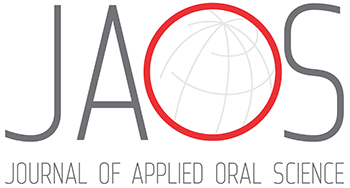| Actinomyces group |
|
|
|
|
|
|
A. naeslundii I (12104a)
|
100,000 (0 – 500,000) |
500,000 (10,000 – 1,000,000) |
0.9863 |
0.3239 |
0.6491 |
|
A. gerencseriae (23860a)
|
10,000 (0 – 100,000) |
0 (0 – 500,000) |
-0.0069 |
0.9945 |
0.9945 |
|
A. israelli (12102a)
|
500,000 (100,000 – 500,000) |
500,000 (0 – 500,000) |
-0.1552 |
0.8767 |
0.9228 |
|
A. oris (naeslundii II) (43146a)
|
500,000 (10,000 - 500,000) |
55,000 (0 - 100,000) |
-12.730 |
0.2030 |
0.6491 |
| Purple Complex |
|
|
|
|
|
|
V. parvula (10790a)
|
500,000 (100,000 – 1,000,000) |
0 (0 – 500,000) |
-0.9144 |
0.3605 |
0.6555 |
|
A. odontolyticus I (17929a)
|
500,000 (10,000 – 500,000) |
55,000 (0 – 500,000) |
-14.236 |
0.1546 |
0.6491 |
| Yellow Complex |
|
|
|
|
|
|
S. sanguinis (10556a)
|
500,000 (100,000 – 1,000,000) |
55,000 (0 – 500,000) |
-15.493 |
0.1213 |
0.6491 |
|
S. oralis (35037a)
|
500,000 (100,000 – 1,000,000) |
100,000 (0 – 500,000) |
-11.029 |
0.2701 |
0.6491 |
|
S. intermedius (27335a)
|
500,000 (100,000 – 500,000) |
100,000 (0 – 500,000) |
-0.3049 |
0.7604 |
0.8471 |
|
S. gordonii (10558a)
|
10,000 (0 – 500,000) |
0 (0 – 500,000) |
-0.3024 |
0.7624 |
0.8471 |
|
S. mitis (49456a)
|
500,000 (100,000 – 1,000,000) |
300,000 (0 – 500,000) |
-0.4891 |
0.6247 |
0.8471 |
| Green Complex |
|
|
|
|
|
|
A. actinomycetemcomitans (43718a + 29523a)
|
0 (0 – 500,000) |
0 (0 - 0) |
-0.4299 |
0.6673 |
0.8471 |
|
C. ochracea (33596a)
|
100,000 (100,000 – 500,000) |
50,000 (0 – 100,000) |
-0.9559 |
0.3391 |
0.6491 |
|
C. gingivalis (33624a)
|
100,000 (10,000 – 500,000) |
0 (0 – 100,000) |
-10.409 |
0.2979 |
0.6491 |
|
E. corrodens (23834a)
|
10,000 (0 – 100,000) |
0 (0 - 0) |
-0.7213 |
0.4708 |
0.6975 |
|
C. sputigena (33612a)
|
500,000 (0 – 1,000,000) |
5,000 (0 – 100,000) |
-11.204 |
0.2625 |
0.6491 |
| Orange Complex |
|
|
|
|
|
|
S. constellatus (27823a)
|
10,000 (0 - 500,000) |
5,000 (0 – 100,000) |
-0.4025 |
0.6873 |
0.8471 |
|
E. nodatum (33099a)
|
500,000 (100,000 – 500,000) |
300,000 (10,000 – 500,000) |
-0.0882 |
0.9298 |
0.9536 |
|
F. nucleatum (sp vincentii) (49256a)
|
100,000 (10,000 – 500,000) |
100,000 (100,000 – 500,000) |
0.4375 |
0.6617 |
0.8471 |
|
F. nucleatum (sp polymorphum) (10953a)
|
500,000 (100,000 – 1,000,000) |
100,000 (0 – 500,000) |
-0.2265 |
0.8208 |
0.8874 |
|
F. nucleatum (sp nucleatum) (25586a)
|
500,00 (0 -500,000) |
50,00 (0 – 500,000) |
-0.8046 |
0.4210 |
0.6736 |
|
C. rectus (33238a)
|
100,000 (0 – 100,000) |
0 (0 – 10,000) |
-17.385 |
0.0821 |
0.6491 |
|
P. micra (33270a)
|
500,000 (500,000 – 1,000,000) |
100,000 (0 – 100,000) |
-2,2159 |
0.0267* |
0.5340 |
|
P. nigrescens (33563a)
|
100,000 (10,000 – 500,000) |
50,000 (0 – 500,000) |
-11.087 |
0.2676 |
0.6491 |
|
C. showae (51146a)
|
100,000 (10,000 – 500,000) |
10,000 (0 – 10,000) |
-0.8467 |
0.3972 |
0.6620 |
|
F. periodonticum (33693a)
|
100,000 (0 – 500,000) |
0 (0 – 10,000) |
-0.9821 |
0.3261 |
0.6491 |
|
C. gracilis (33236a)
|
100,000 (10,000 – 500,000) |
10,000 (0 – 100,000) |
-0.3369 |
0.7362 |
0.8471 |
|
P. intermedia (25611a)
|
500,000 (100,000 – 1,000,000) |
55,000 (0 – 500,000) |
-14.973 |
0.1343 |
0.6491 |
| Red Complex |
|
|
|
|
|
|
P. gingivalis (33277a)
|
500,000 (10,000 – 1,000,000) |
500,000 (10,000 – 500,000) |
-0.7384 |
0.4603 |
0.6975 |
|
T. denticola (B1b)
|
500,000 (500,000 – 500,000) |
100,000 (0 – 100,000) |
-2,7199 |
0.0065* |
0.2600 |
|
T. forsythia (43037a)
|
500,000 (100,000 – 1,000,000) |
5,000 (0 – 500,000) |
-13.922 |
0.1639 |
0.6491 |
| Other species |
|
|
|
|
|
|
T. socranskii (S1b)
|
0 (0 – 10,000) |
0 (0 - 0) |
-0.8784 |
0.3797 |
0.6603 |
|
E. saburreum (33271a)
|
500,000 (100,000 – 500,000) |
10,000 (0 – 100,000) |
-19.712 |
0.0487* |
0.6491 |
|
S. anginosus (33397a)
|
100,000 (10,000 – 500,000) |
5,000 (0 – 500,000) |
-11.209 |
0.2623 |
0.6491 |
|
N. mucosa (19696a)
|
1,000,000 (100,000 – 1,000,000) |
100,000 (10,000 – 500,000) |
-16.893 |
0.0912 |
0.6491 |
|
S. noxia (43541a)
|
0 (0 – 100,000) |
0 (0 - 0) |
-0.3673 |
0.7134 |
0.8471 |
|
P. acnes (11827a + 11828a)
|
0 (0 – 10,000) |
0 (0 - 0) |
-13.419 |
0.1796 |
0.6491 |
|
P. melaninogenica (25845a)
|
500,000 (100,000 – 1,000,000) |
100,000 (100,000 – 1,000,000) |
-10.475 |
0.2949 |
0.6491 |
|
G. morbillorum (27824a)
|
500,000 (10,000 – 500,000) |
10,000 (10,000 – 100,000) |
-0.9525 |
0.3408 |
0.6491 |
|
L. buccalis (14201a)
|
500,000 (100,000 – 500,000) |
100,000 (0 – 500,000) |
-0.5614 |
0.5746 |
0.8209 |

